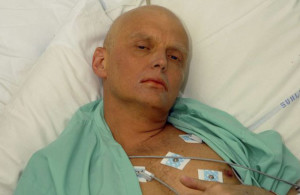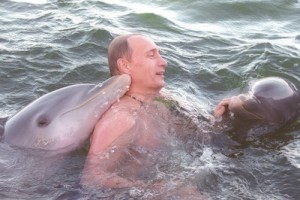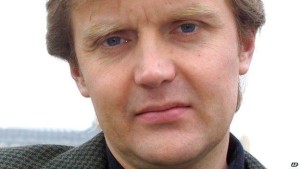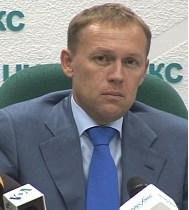
Alexander Litvinenko just before his death on 23 November 2006 from poisoning (Polonium-210). (Source: Getty Images)
Staying with the leadership theme – this time an example of really bad and corrupt leadership – Vladimir Putin. A report was released this week into the death in London of former Russian spy Alexander Litvinenko at the age of 43.
Litvinenko, who was born in Voronezh in 1962, was a former lieutenant-colonel with the Russian FSB (Federal Security Bureau – the successor to the KGB). However, he defected to Britain in 2000 – he said he became disillusioned with the level of corruption by the FSB on behalf of the Russian state.
Once in Britain, he wrote a book called Blowing up Russia: Terror from Within, in which he accused the FSB of blowing up apartments in Moscow and two other cities in 1999 then blaming the bombings on Chechen separatists. The bombings were then used, he claimed, by Russia as an excuse for their second invasion of Chechnya.
He became a British citizen in 2006. At some point he also apparently began working for MI6 – the British Secret Service.
The BBC reports:
It is alleged Mr Litvinenko was investigating Spanish links to the Russian mafia and had planned to fly to Spain with former agent Andrei Lugovoi (also spelled Andrey Lugovoy) – the main suspect over his murder.
At a central London hotel on 1 November 2006, he took tea with Mr Lugovoi and Dmitri Kovtun, who was also a former Russian agent.
Mr Litvinenko fell ill soon afterwards and spent the night vomiting.
Three days later he was admitted to Barnet General Hospital in north London, where his condition gradually became a cause for concern.
On 11 November he was interviewed by the BBC Russian Service and said he was in “very bad shape” after a “serious poisoning”.
During that same interview, Mr Litvinenko – a critic of the Putin regime – said he had been looking into the assassination of Russian journalist Anna Politkovskaya, who had received death threats before being shot at her Moscow apartment block the previous month.
On 17 November he was transferred to University College Hospital in London after his condition worsened.
He died six days later, with his wife Marina, father Walter, and son Anatoli at his bedside.
A post-mortem confirmed poisoning with the radioactive substance Polonium-210. According to the BBC, the Police followed a radioactive trail to multiple locations including the London Millennium Hotel, the Abracadabra lap-dancing club, the Emirates football stadium (where Lugovoi watched Arsenal play CSKA Moscow), two planes at Heathrow Airport, the British embassy in Moscow, and at a flat in Hamburg, Germany, linked to Mr Kovtun. They reported that more than 700 people had to be tested for radiation poisoning as a result. Apparently none were found to be “seriously ill,” whatever that means.
As a result of that, and other factors, it was recommended that Lugovoi be charged with the murder of Litvenenko. According to the BBC:
At a news conference in Moscow, Mr Lugovoi repeatedly stressed his innocence and claimed Mr Litvinenko was a British spy who might have been killed by the British security services.
The office of the prosecutor general in Moscow was quick to declare that Mr Lugovoi could not and would not be extradited because the constitution prevented the extradition of Russian citizens.
As Lugovoi’s situation became known in Russia following the accusation, the leader of the Liberal Democratic Party of Russia, Vladimir Zhirinovsky, announced on 15 September 2007 that Lugovoi would be number two on the party’s candidate list (second only to Zhirinovsky himself) for the Duma (Russian parliament) election. So at the December 2007 election Lugovoi became an MP and thus acquired parliamentary immunity from prosecution.
According to Wikipedia, Zhirinovsky’s reaction to Litvinenko’s death was:
Any traitor must be eliminated using any methods. If you have joined the special services to work, then you should work, but to betray, to run away abroad, to give up the secrets you learned while working—all of this looks bad.
Also from Wikipedia, “Sergei Abeltsev, Zhirinovsky’s former bodyguard and State Duma member from the LDPR, also stated:
The deserved punishment reached the traitor. I am sure his terrible death will be a warning to all the traitors that in Russia the treason is not to be forgiven. I would recommend to citizen Berezovsky to avoid any food at the commemoration for his crime accomplice Litvinenko.”
The British Home Secretary, Theresa May made a statement to parliament following the release of the official enquiry by Sir Robert Owen, a retired High Court Judge. It included the following (my emphasis):
The Inquiry has also found that Lugovoy and Kovtun were acting on behalf of others when they poisoned Mr Litvinenko. There is a strong probability that they were acting under the direction of the Russian domestic security service – the Federal Security Service or FSB. And the Inquiry has found that the FSB operation to kill Mr Litvinenko was probably approved by Mr Patrushev, the then head of the FSB, and by President Putin.
The Government takes these findings extremely seriously – as I am sure does every member of this House. We are carefully considering the report’s findings in detail, and their implications. In particular, the conclusion that the Russian state was probably involved in the murder of Mr Litvinenko is deeply disturbing. It goes without saying that this was a blatant and unacceptable breach of the most fundamental tenets of international law and of civilised behaviour. But we have to accept this does not come as a surprise. The Inquiry confirms the assessment of successive governments that this was a state sponsored act. This assessment has informed the Government’s approach to date.
…At the time the independent Crown Prosecution Service formally requested the extradition of Mr Lugovoy from Russia. Russia refused to comply with this request – and has consistently refused to do so ever since. It is now almost ten years since Mr Litvinenko was killed. Sir Robert Owen is unequivocal in his finding that Andrey Lugovoy and Dmitri Kovtun killed him. In light of this most serious finding, Russia’s continued failure to ensure that the perpetrators of this terrible crime can be brought to justice is unacceptable. I have written to the Director of Public Prosecutions this morning asking her to consider whether any further action should be taken, both in terms of extradition and freezing criminal assets. These decisions are, of course, a matter for the independent Crown Prosecution Service. But the Government remains committed to pursuing justice in this case.
It is worth reading her full statement in the link above – diplomatic language doesn’t get much tougher than this.
Patrick Worrall of Channel 4 News has compiled a list of Kremlin critics who have died in mysterious circumstances since 1994. There are 22 names on the list, the vast majority of whom died during Putin’s tenure.
Last week, reader Diana McPherson and I got into a debate with a third party about Putin on another website. This person, who is Russian but doesn’t live there, appears to hero worship Putin. She denied all of the evidence Diana and I put to her regarding Putin’s behaviour, and accused me of lying about him, even to the extent of creating false screenshots, in Russian, which I can’t even recognize from any other Cyrillic language.
 Her parting shot was the photo on the right, accompanied by the comment:
Her parting shot was the photo on the right, accompanied by the comment:
Here is a picture of Putin for your pleasure … Dolphins are excellent judges of human character.
Well I suppose that settles it. No need for courts, evidence, or investigations. We just need this modern version of the medieval Trial by Ordeal.
This shows that if you largely control the country’s media, as Putin does, you control not only public opinion, but what you consider acceptable behaviour. Russian citizens Zhirinovsky and Abeltsev in their responses that Litvinenko’s death is perfectly acceptable in the protection of the state is chilling. As atheists, we often express our concern at the affect religion can have on what is deemed morally acceptable. In this case it is extreme nationalism and the atmosphere of “us against the world” that Putin has engendered in Russia.



From my reading, the ridiculously long period from crime to report had to do with sensitive diplomacy going on between the West and Russia. They held off for years hoping to persuade Putin to adopted a more cooperative attitude on a number of internationally significant issues. I assume the release of the report now is because the West has given up hope that Russia is ready to join the civilized world.
I think it was to do with classified information. They couldn’t release anything back then because it would expose information. Putin knew it and was laughing at them from Russia as he promoted and provided accolades to the guys who whacked Litvinenko.
I read an interview with Kasparov who, after the interviewer asked him if he is afraid for his life, replied that he is very careful who he has tea with.
As Diana said.
Re the “classified information,” the government tried to stop the enquiry even happening through the courts. The court ruled the government didn’t have a case, and so the enquiry went ahead.
Death stalks spies and traitors. The US killed the Rosenbergs. Not saying it is right, but not the same as slaughtering innocents (which Putin has probably done as well, but so have we.
The difference is systemitized corruption. Under Yeltsin, Russia began to head toward a liberal democratic society. Unfortunately, Yeltsin really made a mess of things. But, in the beginning, Putin made very good reforms, bringing on board Herman Gref, who did wonders for Russia’s economy. Putin even curbed the corruption of the oligarchs….but then he instead chose to take that power for himself. Under Putin, the corruption that already existed, was systemitized.
No doubt, the world of politics and war is a nasty, dark one but there is a stark difference between how things go down in Russia and how things go down in America.
And, as my mother (and grandmother, and great-grandmother used to say) says, and I say now too, two wrongs don’t make a right.
Well said, Heather. Glad to see your follow-up to both the Obama assessement and the spoutings on WEIT of V. 😉
I’ve kept a copy of the permalink to the debate, but I thought it was going a bit far to name her or link to it. 🙂
It was the case of Boris Nemtsov’s murder that shocked me the most. I have no idea whether Putin had anything at all to do with the killing – and no way of finding out, either: the shocking part was that Putin made a public show of taking personal responsibility for the subsequent investigation – despite being a SUSPECT in the case – and certainly an interested party, so if he wasn’t a suspect before, taking over the investigation instantly made him one.
And this is what makes me think Russians are weird: he got away with it.
I found that one particularly shocking too. As you say, there’s no way to prove it definitively, but I think Putin ordered the hit. With Nemtsov, he crossed a line. I thought Nemtsov was sort of safe because he was so well known.
I don’t think Russians are weird, I think they’re in an information bubble. Most get their info from television, which Putin controls. The internet is controlled (though with a light enough hand it’s not always noticeable), and people are told constantly that the rest of the world hates them, especially the Americans, and they have to stick together. It’s master manipulation.
It’s been done fairly gradually too. If Nemtsov had been assassinated in 2005, there might have been a lot more questions asked, but ten years down the track and there’s been a managed shift in public sentiment. That’s my judgement anyway – could be completely off track of course!
Well, “Russians are weird” was a kind of joking summary of what you’ve just said.
Although it’s exactly the way my wife (born in Russia, but left at the age of two) would put it.
Sorry I misunderstood. I can see it now that you’ve explained. 🙂
Heather, have you read Strongman: Vladimir Putin and the Struggle for Russia? I highly recommend it. The author worked with Putin as a media consultant and was a diplomat of sorts I believe with Britain.
Putin promoted the guy who whacked Litvinenko and he knew full well that Britain, though they had all the evidence, couldn’t come out in public and show the evidence because it would expose classified information. I think poisoning him in a way that is the signature of the KGB/FSB was a way to publicly let everyone know who whacked him.
Now, I think Litvinenko didn’t do himself any favours when he was in the UK. He seemed a little off his rocker, accusing Putin of being a pediphile, but I think the reason he left was that he learned of another guy that was going to be whacked and he went to the papers over it.
Thanks for the recommendation – I’ve noticed that book being recommended to me on Amazon because of other stuff about Putin I’ve bought. It’s always hard to know whether a book is worth buying though.
I vaguely remember Litvinenko being arrested for something serious at some point, and his release seemed a bit suspect. I can’t help wondering if charges were dropped because he worked for MI6, or maybe as a recruitment bonus. Killing him in such a Russian way makes his info seem more credible – if he was just a conspiracy theorist of something, he wouldn’t be worth worrying about.
Here is an interesting Guardian article I read today. It comes off a bit snooty in spots but it makes some good points.
It’s an excellent article. There are a couple of points he gets a bit carried away in his criticisms, but on the whole I agree with him.
I was interested in this bit too:
I didn’t know about Russia’s Extremism Law. It’s absolutely chilling that a citizen can be legally killed in that situation.